BAE Systems Maritime – Naval Ships
BAE Systems Maritime – Naval Ships is a wholly owned subsidiary company of BAE Systems, specialising in naval surface shipbuilding and combat systems integration. One of three divisions of BAE Systems Maritime, along with BAE Systems Submarines and BAE Systems Maritime – Maritime Services, it is the largest shipbuilding company in the United Kingdom, one of the largest shipbuilders in Europe, and one of the world's largest builders of complex warships.[6]
| Type | Private |
|---|---|
| Industry | Defence Shipbuilding Marine engineering |
| Predecessor | BAE Systems Surface Fleet Solutions VT Shipbuilding |
| Founded | 1 July 2008 (as BVT Surface Fleet)[1][2] |
| Headquarters | , Scotland, UK |
Key people | Sir John Parker – Chairman (2008–2009)[3] Alan Johnston CBE – CEO (2008–2011)[3] Iain Stevenson – managing director (2016–Present) Heather Lee- HR director (2018-present)Engineering Director Paul Feely(2016-Present) Shipbuild Director David Goodfellow (2003-Present) |
| Products | Naval vessels |
| Services | Ship design Ship support |
| Revenue | £1.12 Billion (FY 2008/09)[4] |
| £45 Million[5] | |
| Total assets | £352 Million[5] |
Number of employees | Approximately 7,000 |
| Parent | BAE Systems Maritime |
| Website | www.baesystems.com |
It was originally formed as a joint stock subsidiary on 1 July 2008, with the merger of BAE Systems Surface Fleet Solutions and VT Shipbuilding, creating a new firm named BVT Surface Fleet.
The new firm incorporated the BAE Systems Surface Fleet Solutions operated shipyards at Scotstoun and Govan on the River Clyde in Glasgow and the VT Shipbuilding facilities within the Naval Base at Portsmouth.
BAE Systems subsequently acquired VT Group's share of the joint venture on 30 October 2009 and renamed the business BAE Systems Surface Ships Ltd.
On 1 January 2011, BAE Systems Surface Ships was operationally integrated with BAE Systems Submarine Solutions to form BAE Systems Maritime. On 1 January 2012, BAE Systems Surface Ships was formally restructured and rebranded as BAE Systems Maritime – Naval Ships and BAE Systems Maritime – Maritime Services, the former incorporating the shipbuilding operations and combat systems development and the latter in-service support.[7]
History
Defence Industrial Strategy
The Ministry of Defence's (MOD) 2005 Defence Industrial Strategy encouraged BAE and VT Group to form a naval shipbuilding joint venture with the aim of maintaining the UK's naval shipbuilding capability in the long-term. In return, in July 2007 the MoD guaranteed the new company a certain amount of work for 15 years, or to pay penalties instead.[8][9] The Terms of Business Agreement (ToBA) finally signed in July 2009 promised a minimum level of ship build and support activity of around £230 million/year to sustain a warship industry in the UK.[10] The government could cancel the deal at any time, subject to penalties which would decline over the course of the agreement but which would have been £630m at the time of the 2010 SDSR,[10] in lieu of the MoD's existing liability for rationalisation costs under Yellow Book rules.[11]
Explaining the rationale for the joint venture from VT Group's perspective, its CEO Paul Lester described shipbuilding as a "lumpy" business, dependent on large contracts placed at irregular intervals. Another issue was the competition between VT and BAE: "We don't want to get into a dogfight with BAE over who would be the survivor... That's what you'd be talking about at some stage."[9]
BAE and VT concluded the merger discussions in early 2008, however creation of BVT Surface Fleet was conditional on the signing of contracts for the Queen Elizabeth-class aircraft carriers.[12] Following the Ministry of Defence's announcement on 20 May 2008 that it intended to proceed with the manufacturing stage of the project, BAE announced its intention to finalise the joint venture arrangements with VT Group.[13] This was completed on 11 June 2008 and, following VT Group shareholder approval on 30 June, the joint venture became operational on 1 July.[2][3]

BAE Systems and VT Group owned 55% and 45% of the company respectively, however they had equal board representation and voting rights.[14]
In return, VT Group acquired BAE System's 50% share in their other joint venture company Flagship Training, now known as VT Flagship. BVT Surface Fleet subsumed another BAE/VT joint venture, Fleet Support Limited, a ship repair, maintenance and marine engineering company, based within HMNB Portsmouth.
The new 15-year Terms of Business Agreement with the Ministry of Defence did result in some controversy however. On 30 June 2009, a BVT memo was leaked which suggested that two of the company's three shipyards could be closed following completion of Queen Elizabeth-class carrier construction.[15][16] In response to the leak, BVT said the memo was "worst-case scenario planning" and that it continues to invest in the future of all its yards. However a MOD spokesman said "[the MOD] had to look at the consequences of reduced demand for navy shipbuilding."[16] No firm decisions will be taken until after the Scottish independence referendum in September 2014 as London has made it clear that it would not buy warships from a foreign shipyard. The preferred plan is to consolidate shipbuilding onto the Govan site and invest £300m in a new covered "frigate factory" to build the Type 26.
Locations
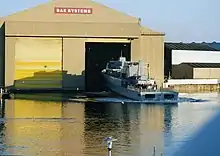
BAE Systems Surface Fleet Solutions own's one shipyard on the River Clyde in Glasgow: Scotstoun (formerly Yarrow Shipbuilders Ltd) and runs the second Govan (formerly Kvaerner Govan, Govan Shipbuilders, Upper Clyde Shipbuilders and Fairfields), shipyard that have a corporate heritage extending back as far as 1834. VT Shipbuilding (formerly Vosper Thornycroft) owned shipbuilding facilities completed in 2003 within HMNB Portsmouth and a boatyard, VT Halmatic, in Portchester. These facilities were transferred to BVT Surface Fleet, although the VT Halmatic yard was subsequently sold to Trafalgar Wharf, with the Halmatic Small Boats Centre of Excellence moving to a new facility in Portsmouth Naval Base.
BAE Systems Surface Fleet Solutions also operated an additional project management centre at Filton in Bristol, situated close to key stakeholders at MoD Abbey Wood, which was transferred to BVT.
The BAE Systems Submarines Shipyard at Barrow-in-Furness was not included in the joint venture, although since January 2011 Submarines and Surface Ships were operationally integrated under BAE Systems Maritime.
VT Group exit
At the time of BVT's creation, VT Group was expected to eventually sell its minority share to BAE Systems through a put option, but not within three years.[17][18][19] However, on 28 January 2009 VT Group announced its intention to sell its share.[20] VT Group's put option valued its share at a minimum of £380 million subject to conditions; however it received £346 million after various payments to BAE. In addition, VT Group agreed to pay £43 million compensation to BVT for cost overruns on contracts with Trinidad & Tobago and Oman that BVT had inherited from VT Shipbuilding. VT Group's net proceeds from the sale of its share in BVT to BAE Systems were therefore £303 million.[21]
Products and services

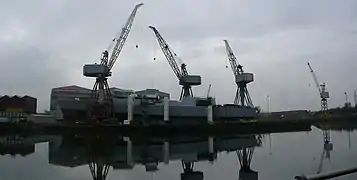
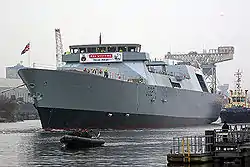
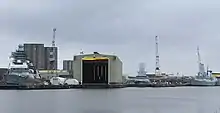
Aircraft carriers and amphibious assault ships
BAE Systems Maritime is undertaking a majority of the workload for the two Queen Elizabeth-class aircraft carriers, the first of which was floated off in July 2014 and is now undergoing sea trials. As part of the Aircraft Carrier Alliance, Thales and Babcock are also involved in the project.[22] The company's shipyards have previously had experience of constructing large amphibious assault ships, including the Ocean-class LPH, the Albion-class LPD and the Bay-class LSD(A)s.
Destroyers
BAE's three shipyards all built sections of the Type 45 destroyer, which started as a collaboration between BAE and VT Group. Daring, Dauntless, Diamond, Dragon, Defender and Duncan have all entered service with the Royal Navy. The first of class entered service in May 2009.
In 2007 BAE produced a concept for a UXV Combatant based on a destroyer hull for the operation of unmanned land, air and sea systems.[23]
Frigates and corvettes
BAE Systems Maritime inherited the £400 million Khareef-class corvette project from VT Group, which will see three 99 m (324 ft 10 in) ships delivered to the Royal Navy of Oman[24] in 2013–14.
BAE Systems Maritime – Naval Ships' yards have also delivered the following in the recent past:
- Nakhoda Ragam-class corvettes to the Royal Brunei Navy (Indonesian Navy from 2013)
- Qahir-class corvettes to the Royal Navy of Oman
- Lekiu-class frigate for the Royal Malaysian Navy
Design work is currently underway on the Type 26 frigate project for the Royal Navy, as part of the wider Global Combat Ship programme, which will eventually replace the Type 23 frigates currently in service. Construction of the first of class, HMS Glasgow, started on 20 July 2017 with first steel being cut in the Govan shipyard.[25]
Offshore patrol vessels and fast attack craft
VT Shipbuilding was responsible for the construction of four River-class patrol vessels for the Royal Navy, with through-life maintenance the ongoing responsibility of BAE Systems Maritime; initially the company leased them to the UK Ministry of Defence until the MoD found the money to buy them. The company completed three Port of Spain-class OPVs based on the Rivers for the Trinidad and Tobago Defence Force in 2010. After the contract was cancelled by the Trinidad & Tobago government in September 2010, these vessels were subsequently contracted for delivery to the Brazilian Navy in January 2012 as the Amazonas class. A technology transfer agreement with Bangkok Dock to build a similar 90 m (295 ft 3 in) OPV, HTMS Krabi, for the Royal Thai Navy was agreed in June 2009.[26] In 2014 the Royal Navy company signed a £348m deal for three improved Rivers to keep the company busy until Type 26 construction began using money that would have been paid to BAE anyway under the ToBA.
BAE Systems Maritime also has a technology transfer agreement in place with Elefsis Shipyards for the construction of the Roussen-class fast attack craft for the Hellenic Navy, which are based on the Barzan (Vita)-class FACs currently in service with the Qatar Armed Forces; itself based upon Vosper Thornycroft's 56 m (183 ft 9 in) patrol craft built for the Royal Navy of Oman and the Kenya Navy.
Auxiliaries
BAE was initially part of a consortium bidding for the Military Afloat Reach and Sustainability (MARS) programme, which was to see up to six replenishment at sea tankers built for the Royal Fleet Auxiliary. BAE was partnered with BMT Defence Services and Daewoo Shipbuilding & Marine Engineering – the eventual winners – for the project, but subsequently withdrew from the consortium before the final round.[27]
BAE Systems had previously been prime contractor on the Wave-class tanker programme for the Royal Fleet Auxiliary.
Halmatic small boats
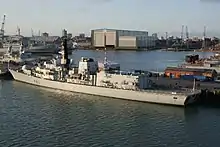
BAE Systems Maritime – Naval Ships' capabilities also extend to Mine countermeasures vessels (The Sandown class in service with the Royal Navy, Royal Saudi Navy and Estonian Navy), prime contracting on hydrographic survey vessels such as the Echo class, Scott class and the design and production of the smaller Halmatic range of boats such as landing craft, rigid-hulled inflatable boats and rigid buoyant boats. These products include the Lifespan Patrol Vessel, Rigid Raider, Mk 6 Assault Boat and Combat Support Boat types currently in service with the British Armed Forces and other Navies, such as the Jordanian Royal Naval Force and the Republic of Singapore Navy.[28]
Support services
BAE Systems Maritime's Support services include supply chain management and logistics support. The BAE subsidiary BAE Systems Maritime – Maritime Services provides through life maintenance, ship repair and drydock refit services for naval and merchant vessels.
Past projects have included the reactivation of the Upholder class, now reactivated as the Victoria-class submarines for the Royal Canadian Navy. It has also refitted two ex-Royal Navy Type 22 (Batch 2) frigates for the Romanian Naval Forces and a similar programme for the Chilean Navy involving the refurbishment of three ex-Royal Navy Type 23 frigates.
In July 2009, BVT Surface Fleet established the Gulf Logistics and Naval Support joint venture with Abu Dhabi Shipbuilding, to provide in-region maritime support services for CCASG member states.

See also
- BAE Systems
- BAE Systems Marine (1999–2003)
- BAE Systems Naval Ships (2003–2006)
- BAE Systems Surface Fleet Solutions (2006–2008)
- BAE Systems Maritime – Maritime Services (2012–present)
- BAE Systems Submarines (2012–present)
- VT Group
- BAE Systems Ship Repair (United States)
- BAE Systems Australia (Naval)
References
- "Warship deal takes a step closer". BBC News. BBC. 1 July 2008.
- "BVT Surface Fleet Joint Venture becomes operational" (Press release). BAE Systems plc. 30 June 2008. Retrieved 1 July 2008.
- Jameson, Angela (11 June 2008). "VT Group and BAE Systems agree merger to build warships". The Times. London: Times Newspapers. Retrieved 1 July 2008.
- BAE Systems – Warship Business Gives Boost to UK Economy
- BAE & VT Group Finalize, then Dissolve, UK Surface Ship JV
- The Scotsman - VT makes its final shipyard departure with £300m sale
- "BAE Systems Maritime".
- O'Connell, Dominic (29 July 2007). "UK naval yards get 15-year jobs vow". Sunday Times. Times Newspapers. p. 2. Retrieved 19 August 2014.
- Webb, Tim (16 December 2007). "Abandon ships and sail on: As VT Group and BAE Systems merge shipbuilding arms, the US army and the BBC will occupy Paul Lester". The Observer. London: Guardian Newspapers. p. 7. Retrieved 1 July 2008.
- "The Major Projects Report 2010 - Public Accounts Committee - Supplementary written evidence from the Ministry of Defence". UK Parliament. 15 February 2011. Retrieved 19 August 2014.
- The Yellow Book, formally known as The Government Profit Formula and its Associated Arrangements, is an agreement between the Treasury and CBI governing single-source defence contracts. The MoD is liable for restructuring and redundancy costs when such contracts are cancelled or completed
- Barker, Alex; Pfeifer, Sylvia (21 February 2008). "Navy's aircraft carriers face delay". Financial Times. p. 2.
- "BAE Systems welcomes the MOD carrier announcement" (Press release). BAE Systems plc. 20 May 2008. Retrieved 1 July 2008.
- "VT Group and BAE Systems to create a world-class provider of naval ships and through life support" (Press release). VT Group plc. 25 July 2007. Retrieved 1 July 2008.
- Bolger, Andrew (2 July 2009). "Move to ease fears of shipyard closures". Financial Times. Retrieved 4 July 2009.
- "Two navy shipyards 'could close'". BBC News. 30 June 2009. Retrieved 4 July 2009.
- Griggs, Tom (14 November 2007). "VT Group confident of contract wins". Financial Times. p. 23.
- O'Connell, Dominic (16 December 2007). "Ceasefire in battle of the naval dockyards". Sunday Times. Times Newspapers. p. 13.
- "BAE Systems announces agreement with VT Group". BAE Systems plc. 25 July 2007. Retrieved 28 January 2009.
- Sandle, Paul; Hepher, Tim (28 January 2008). "VT Group to sell stake in shipbuilding JV to BAE". The Guardian. London: Guardian Newspapers. Reuters. Retrieved 28 January 2009.
- Buck, Jonathan. "VT Group Seals Deal To Sell BVT Stake To BAE Systems". Wall Street Journal. Archived from the original on 4 October 2009. Retrieved 25 September 2009.
- "CVF – Royal Navy Future Aircraft Carrier, United Kingdom". www.naval-technology.com. SPG Media Limited. 2008. Retrieved 1 July 2008.
- "BVT Surface Fleet – Destroyers". Archived from the original on 1 December 2008. Retrieved 1 July 2008.
- Scott, Richard (24 January 2007). "VT clinches Khareef OPV deal with Oman". Janes Defence Weekly. The New York Times Company.
- "First Type 26 frigate named HMS Glasgow". BBC. 20 July 2017. Retrieved 20 July 2017.
- BVT wins Thailand design contract
- "BAE Systems to partner with BMT and DSME for MARS fleet tankers" (Press release). BAE Systems plc. 15 February 2008. Retrieved 1 July 2008.
- "BVT Surface Fleet – Products". www.bvtsurfacefleet.com. BVT Surface Fleet. Archived from the original on 14 July 2008. Retrieved 1 July 2008.
